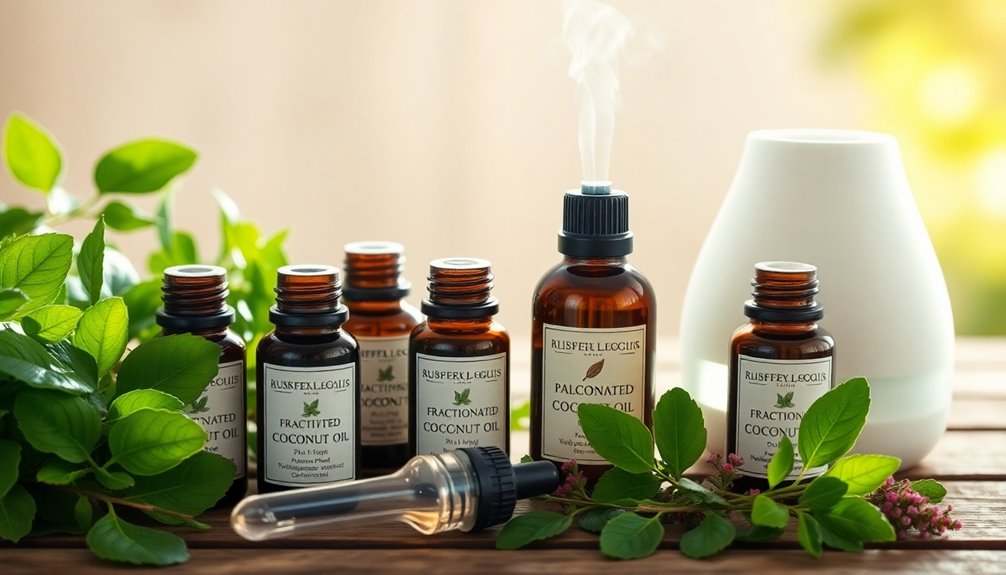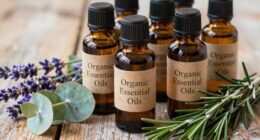Many schools have banned essential oils due to serious health risks, particularly for students with asthma or allergies. These oils can trigger respiratory issues and skin irritations, making safety a top priority. The FDA doesn't approve essential oils for use in schools, and some states classify them as food additives. Parents often advocate for their benefits, but healthcare professionals stress the importance of considering safety first. If you're curious about safer alternatives and the ongoing debates surrounding this ban, there's more information that can provide deeper insight into the situation.
Key Takeaways
- Essential oils are banned in schools due to safety concerns, including potential skin irritation and respiratory issues, especially in sensitive children.
- The FDA does not approve essential oils for consumption or topical use, leading to their classification as food additives in school settings.
- Many parents advocate for essential oils, believing they can alleviate asthma and allergies, highlighting a divide in community opinions on the ban.
- Health professionals emphasize the need for evidence-based practices regarding essential oils, citing risks that may outweigh potential benefits in educational environments.
- Alternative solutions, like non-scented products and indoor plants, are recommended to improve air quality without the risks associated with essential oils.
Safety Concerns With Essential Oils
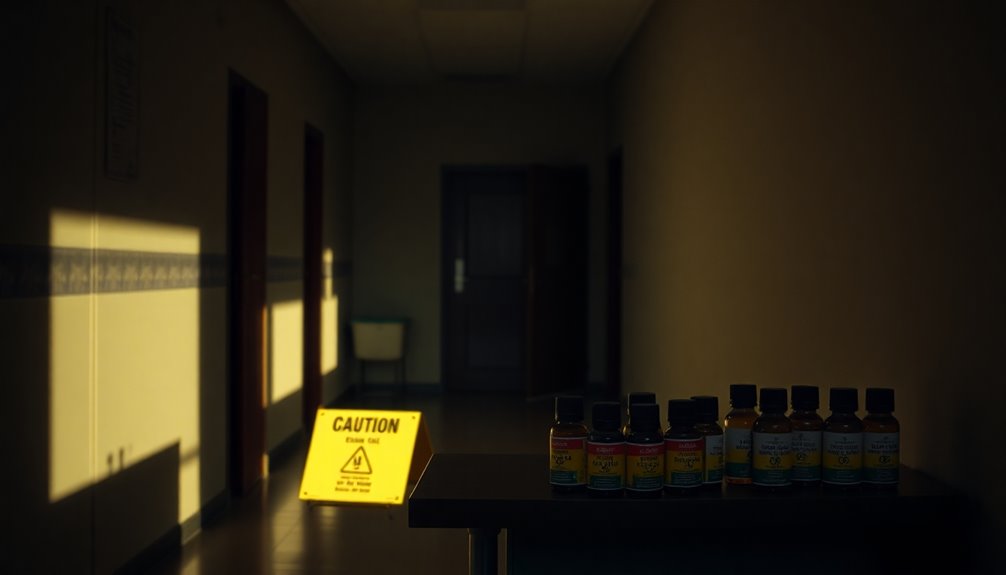
When considering the use of essential oils in schools, it's crucial to recognize the safety concerns that come with them. The FDA doesn't test essential oils for safety or effectiveness, raising alarm bells, especially in educational settings.
The American Academy of Pediatrics warns against using these oils in childcare due to the risk of skin irritation and respiratory issues. While allergic reactions are rare, they can occur and lead to severe responses in sensitive individuals, making caution necessary.
Furthermore, the lack of thorough research and clinical trials on the efficacy and safety of essential oils complicates their usage. These factors have prompted some districts to implement bans, emphasizing the need for a careful approach in schools.
Regulatory Context of the Ban

Although many people believe that essential oils can enhance well-being, the regulatory context surrounding their use in schools paints a different picture.
Jefferson County schools classify essential oils as food additives rather than medications, which has led to their ban due to safety concerns. The FDA hasn't approved essential oils for consumption or topical use, influencing school policies to restrict their use.
Furthermore, recent updates to childcare standards include essential oils among prohibited items, reflecting a growing awareness of their potential health risks.
School nurses are often on the frontline, monitoring students who might've allergic reactions. Since essential oils can cause allergic responses, the lack of thorough research supports the decision to keep them out of educational environments.
Health Risks for Students

Essential oils might seem harmless, but they pose serious health risks for students.
For instance, strong scents can trigger asthma attacks in sensitive kids, and allergic reactions are common, especially in those with plant allergies.
Additionally, the presence of these oils in classrooms can lead to migraines, making it vital to take into account these factors for student safety.
Asthma Attack Risks
While many might see essential oils as harmless, they can pose serious risks for students with asthma. We've found that the strong scents from diffusers can trigger asthma attacks, leading to respiratory distress, especially in sensitive individuals. Additionally, children inhale air at a higher rate than adults, increasing their exposure to harmful volatile organic compounds (VOCs).
| Risk Factor | Description | Impact on Students |
|---|---|---|
| Sensory Overload | Strong scents can provoke migraines and discomfort | Increased anxiety |
| Higher Inhalation Rate | Children breathe more air, heightening exposure | Greater risk of attack |
| Existing Allergies | Allergic reactions can complicate asthma symptoms | Serious health risks |
| Legal Liabilities | Schools may face liabilities for adverse reactions | Financial repercussions |
| Vulnerable Population | Children are more sensitive to strong scents | Increased health risks |
Reducing exposure to essential oils in schools is vital for protecting vulnerable students.
Allergic Reactions Concerns
Allergies can flare up unexpectedly in school environments, especially when strong fragrances from essential oils are present. If you or your child have existing plant allergies, like ragweed, these scents can trigger reactions.
Children are particularly vulnerable, as they tend to inhale more air relative to their size, increasing the risk of respiratory issues. Research shows that essential oils can cause allergic reactions, making it vital to exercise caution in classrooms filled with sensitive individuals.
Additionally, adverse reactions could lead to legal liabilities for schools, underscoring the importance of strict policies regarding essential oil use. Keeping a safe, allergy-friendly environment is essential for all students to thrive without the threat of unexpected health risks. Furthermore, fostering a digital-friendly environment at home can help parents educate their children about the potential risks associated with essential oil use in school settings.
Migraine Triggers in Classrooms
Strong scents in classrooms can lead to migraine triggers for many students, particularly those already prone to headaches.
Essential oils, with their potent fragrances, pose a significant risk, especially for kids who might be sensitive. Research shows that exposure to certain scents can provoke migraines, and children's inhalation rates are higher than adults', increasing their risk of overexposure to harmful compounds.
Additionally, if a student has allergies, fragrances can worsen migraine symptoms.
Implementing policies to limit or ban essential oils in schools can foster a more inclusive environment, allowing students who suffer from migraines or fragrance sensitivities to focus better and participate fully in class activities.
Prioritizing students' health is essential for a productive learning atmosphere.
Parent Perspectives on the Ban
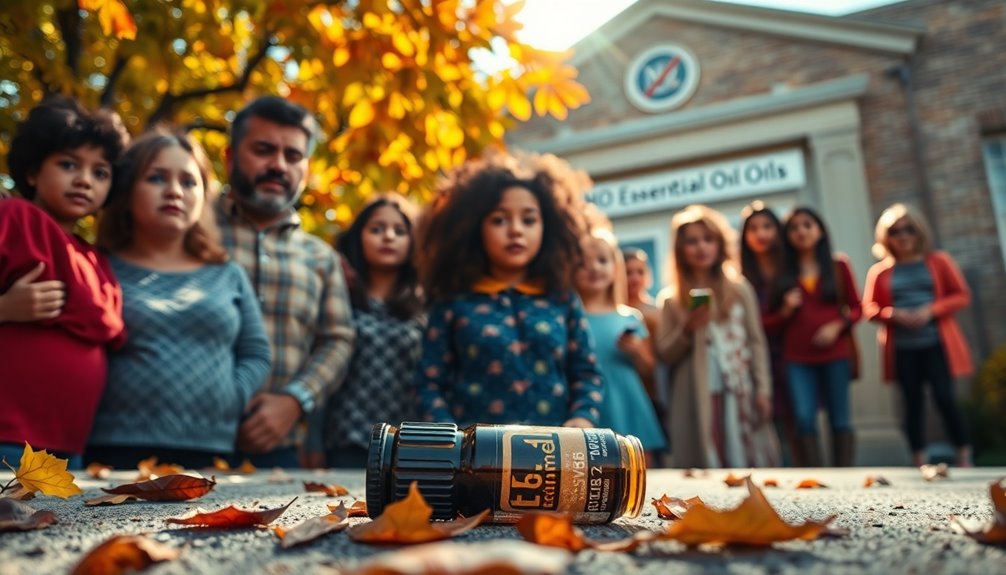
Why are so many parents concerned about the ban on essential oils in schools? Many of you believe that essential oils can relieve conditions like asthma and allergies, advocating for personal choice in treatment. Advocates like Carmine Loper stress the importance of letting families decide on essential oils for their children. Frustration mounts among parents regarding accessibility for working families who may want to administer these treatments. Emotional testimonies reflect the belief in essential oils' benefits, igniting discussions on school health policies. As reactions vary within the community, many parents push for policy revisions to allow essential oils in schools.
| Parent Concerns | Advocates' Views | Community Reactions |
|---|---|---|
| Accessibility Issues | Personal Choice | Mixed Feelings |
| Health Benefits | Family Autonomy | Calls for Policy Change |
| Emotional Testimonies | Importance of Relief | Ongoing Discussions |
Community and Medical Opinions
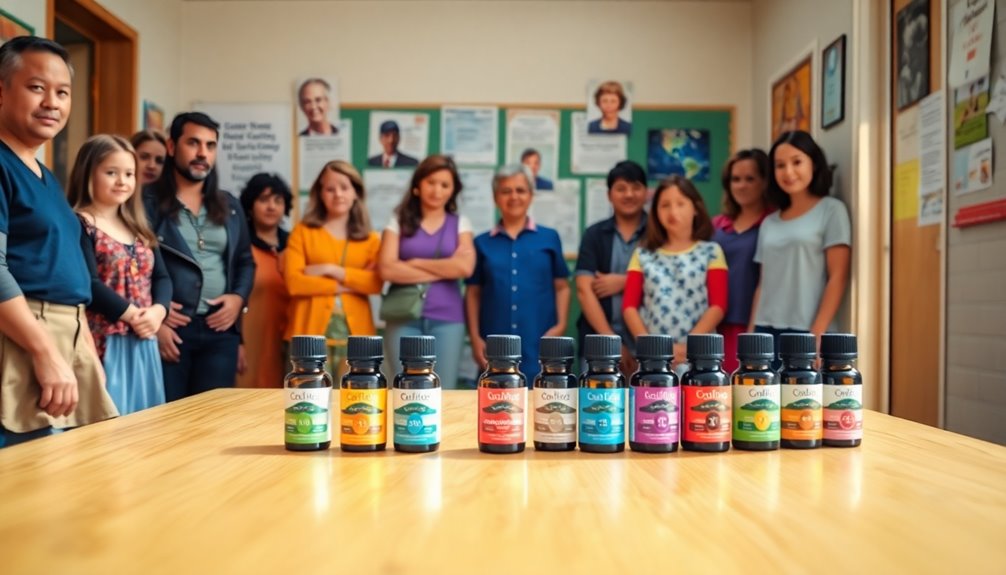
As you explore the community's mixed reactions to the essential oils ban, you'll notice a divide between parents advocating for their benefits and those concerned about potential health risks.
Health professionals emphasize the need for evidence-based practices, especially for children with conditions like asthma or allergies. Research shows that certain scents can reduce cortisol levels, a stress hormone, which could be particularly beneficial in educational settings.
This ongoing debate highlights the importance of prioritizing safety in educational settings while considering parental perspectives.
Mixed Community Reactions
While the ban on essential oils in Jefferson County schools has sparked considerable debate, community reactions reveal a significant divide in opinions.
Some parents passionately advocate for essential oils, believing they can help alleviate conditions like asthma and allergies in children. They argue for the personal choice to use these oils despite the ban.
In contrast, many health professionals support the ban, highlighting safety concerns and the need for reliable information about essential oils.
Discussions within the community show a growing demand for policy revisions or exceptions to the ban, reflecting ongoing tensions regarding alternative health treatments in schools.
Advocacy persists among certain parent groups, even without formal recognition from state health authorities or thorough research on safety and efficacy. Additionally, many experts emphasize the importance of understanding essential oil safety to prevent adverse reactions and ensure responsible use among children.
Health Professional Concerns
Given the rising concerns among health professionals, many are warning against the use of essential oils in school environments.
Pediatricians highlight safety issues, noting that these oils can trigger allergic reactions and worsen asthma symptoms in sensitive students. The limited scientific support for their therapeutic claims raises skepticism among medical experts about their effectiveness in educational settings.
The CDC has also pointed out that fragrances, including essential oils, can harm indoor air quality, affecting both students and staff.
Community health professionals stress the importance of evidence-based practices and thorough risk assessments before allowing essential oils.
Additionally, potential legal liabilities from adverse reactions underscore the need for cautious approaches and thorough parental consent processes when considering their use in schools.
Parental Advocacy Efforts
Health professionals' concerns about essential oils have sparked significant parental advocacy efforts, particularly from those who believe these oils can benefit their children's health.
Parents like Carmine Loper are championing the cause for choice, arguing that families should decide what's best for their kids.
Many express dissatisfaction with the ban, sharing emotional stories of how essential oils have positively impacted their children's well-being.
Here are some key points driving their advocacy:
- Essential oils may help with conditions like asthma and allergies.
- Parents demand the right to administer oils in schools.
- Emotional testimonies highlight the oils' benefits.
- Mixed community responses challenge the ban's validity.
- Studies suggest that improved air quality can enhance children's overall health and well-being.
These efforts underscore the ongoing debate over essential oils in schools.
Alternative Solutions for Schools

As schools seek safer environments for students and staff, they can explore various non-scented alternatives that enhance air quality without the risks of essential oils. Consider implementing educational programs to promote good hygiene and ventilation practices. You can also utilize plants like spider plants or peace lilies, which purify the air naturally. Additionally, natural odor absorbers such as baking soda or activated charcoal effectively manage unpleasant smells without introducing harmful scents. Collaborating with health professionals to create evidence-based guidelines can also improve indoor air quality. Regular maintenance of air purifiers is essential to ensure they function optimally in improving air quality.
| Solution Type | Description |
|---|---|
| Air Purifiers | Use HEPA filters for cleaner air |
| Educational Programs | Teach hygiene and ventilation practices |
| Natural Odor Absorbers | Use baking soda or activated charcoal |
Frequently Asked Questions
What Essential Oils Aren't Safe for Kids?
When considering essential oils for kids, you should be cautious. Oils like peppermint, eucalyptus, and tea tree oil can irritate their respiratory systems, potentially triggering asthma attacks.
Avoid oils from the ragweed family, as they may cause allergic reactions. Strong scents can provoke migraines in sensitive children, and overexposure can lead to adverse effects.
Always check for safety and efficacy, as many oils haven't been rigorously tested for young ones.
What Are the Guidelines for Essential Oils?
When you're looking into essential oils, you might think they're just harmless, pleasant scents.
However, there are guidelines to take into account. You should always dilute oils before use, avoid applying them directly to the skin, and never ingest them without proper guidance.
Be mindful of potential allergic reactions, especially in children.
It's vital to consult with a healthcare professional before using essential oils, ensuring you prioritize safety and well-being in any situation.
Are There Regulations for Essential Oils?
Yes, there are regulations for essential oils, but they're not as stringent as you might think.
Since essential oils are classified as food additives rather than medications, they don't require FDA approval for use in schools. This lack of oversight can lead to potential health risks.
Local policies often reflect broader regulations, which means schools may restrict their use to guarantee safety and minimize risks associated with respiratory irritants.
What Is the 30/50/20 Rule for Essential Oils?
The 30/50/20 rule for essential oils helps you use them safely and effectively.
It suggests you dilute essential oils 30% of the time, avoid them 50% of the time, and use them undiluted 20% of the time, especially for adults in specific situations.
This guideline is vital for children and sensitive individuals, as their bodies react differently.
Always conduct skin patch tests before trying new oils to minimize allergic reactions and guarantee safety.
Conclusion
In the whirlwind of school life, crucial oils may seem like a soothing balm, but their risks can overshadow their benefits. As you navigate this fragrant debate, remember that safety must come first, ensuring every student thrives in a secure environment. While parents and communities voice their concerns, it's essential to explore alternative solutions that foster well-being without compromise. Let's work together to create a healthy atmosphere where every child can flourish without the shadows of potential harm.





